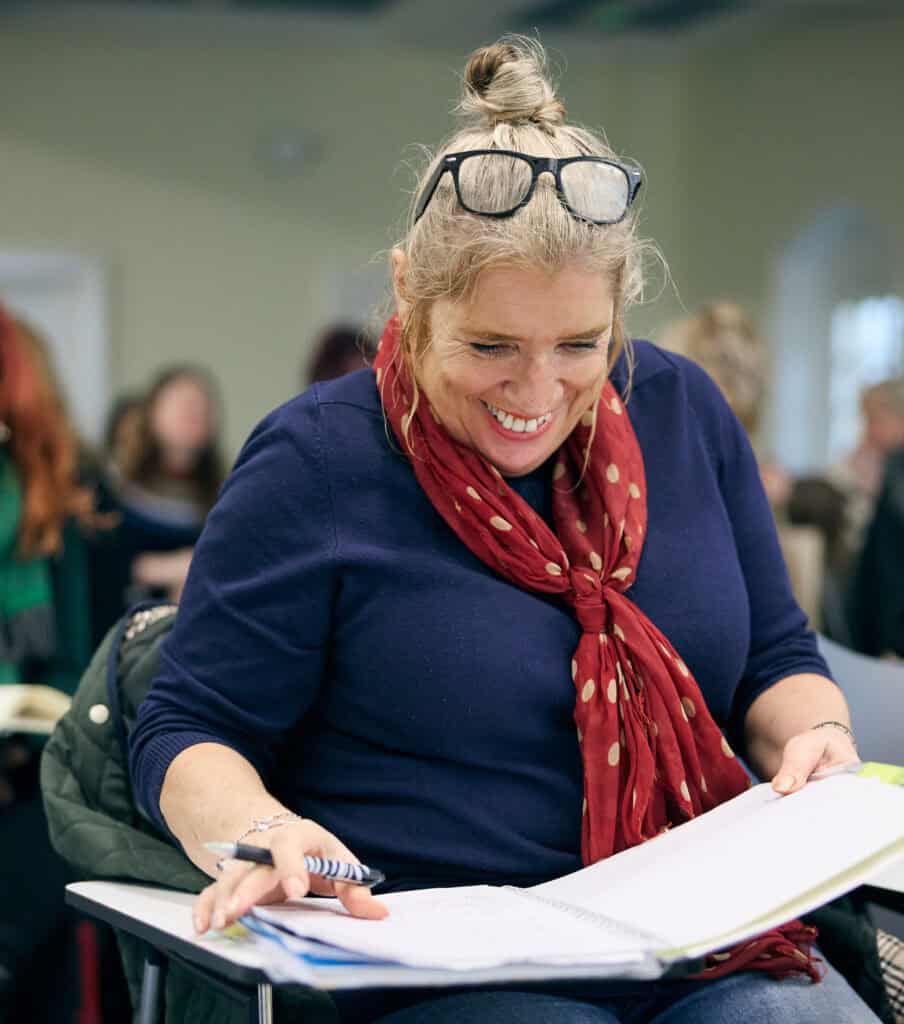6th
in the UK
for graduate prospects
Complete University Guide 2026
Top 10
UK university
for Social Work
Guardian University Guide 2025
100%
positivity for overall learning resources
National Student Survey 2024
Join us at one of our Open Days!
Saturday 11 October
Sunday 26 October
Saturday 22 November
Saturday 11 October
Sunday 26 October
Saturday 22 November
Our next Open Day is in:
Overview
Learn to work effectively with children and adults
Our BA (Hons) Social Work is approved by Social Work England and prepares you for a career in an exciting, challenging and fulfilling profession.
We welcome a range of students with varying backgrounds, whether you’re a college leaver or a mature student.
Gain the skills and knowledge needed for current practice
You will gain a combination of effective and relevant skills alongside up-to-date knowledge of how to work effectively with children, adults and a wide range of social issues.
The course begins with a carefully structured induction programme, before you move on to study modules designed to develop your personal and professional skills.
You will be supported throughout by a structured tutorial programme; linking university-based learning to practice placements.
Our course combines taught modules and high-quality practice placements. This ensures that you will be able to apply in practice the knowledge and skills gained in modules examining:
- Diversity
- Law
- Adult and child development
- Safeguarding
- Mental health
- Disability
- Ethics
- Social work methods.
Apply theory to practice on placements
Alongside your academic learning, you will apply theory to practice via placements with our local partners.
We have cultivated strong relationships with several local authorities, where you will learn to apply your knowledge to real-world situations and gain a vital insight into the professional life of a social worker.
Dedicated personal and academic support
Your tutors ensure that you have excellent academic and personal support throughout your degree, as you gain a firm grounding in the skills, professional theory and values of the social work profession.
We have a long tradition of providing a supportive, student-centred approach to learning and teaching, and we believe it is our role to help you develop both personally and professionally throughout your degree.
This has culminated in our excellent rating in the National Student Satisfaction survey that has underpinned our well-established reputation for teaching Social Work.
Social Work England approved
This course is approved by social work regulator, Social Work England.
By the end of the course, you will be ready to register with Social Work England and begin your career as a registered social work professional.




On this course you will:
- Gain the qualification necessary to enable you to apply to register as a professional social worker.
- Learn from experienced and qualified social workers.
- Study modules that are mapped to the national professional standards for social workers.
- Receive targeted careers support to help you open future career opportunities in a variety of professional roles.
The Course
Prepare for the wide range of experiences and learning opportunities that you will encounter in practice
Our BA (Hons) Social Work course prepares you with the skills and knowledge to work effectively in the challenging but rewarding social work sector.
The course will explore the complexities and intricacies of working within social work, as you learn to work confidently with situations and dilemmas in practice with both adults and children and their families.
You will underpin your theoretical learning with dedicated practical experience and assessment as you build the knowledge and confidence that you will need to progress through your career.
Modules
Select a year
Introduction to Social Work
This module aims to introduce you to social work roles, tasks and settings. There will be opportunities to provide you with a grounding in the historical and social context of social work practice, which will enable you to understand a framework of theories, values, ethics and research mindedness as a foundation for good practice and study throughout the course.
This module will also help to develop your ability to think critically and reflectively.
Child and Adult Development Across the Life Course 1
This module provides you with an introduction to core theories of human development including attachment, loss, emerging identity, and sexuality as they impact children and adolescents.
Characteristics of relative inequality are considered through diverse perspectives, for example, the importance of culture and the environment, diversity, intersectionality, and poverty.
Throughout the module students are encouraged to link development with environment, privilege, and culture.
Intervention, Theories and Skills 1 – Diversity and Difference
This core module runs throughout the three years, linking to all other modules. Each year has an overarching theme and in year one this is identity, diversity, and difference.
The module is fundamental in helping you form a professional identity, maintain boundaries, understand your own place within groups and teams and question the core tenets of social work, including reflective and critical thinking.
You will also be encouraged to link your learning to social work theory and practice.
Social Work Law and Policy
The overall aim of this module is to introduce you to the legal and policy frameworks which underpin professional social work practice.
The module will outline the relationship and key differences between legislation and policy. It will help you appreciate the differing ideological approaches to social policy and how these may find expression in welfare practice and its underlying legal frameworks.
You will also gain knowledge of the law relevant to your particular or intended area of practice. It seeks to explore primary, secondary and tertiary legislation, case law and social policy which has relevance to social welfare.
You will be equipped with a critical understanding of how to apply legislation, case law and policy in practice. After completing this module you should be able to make the link between legal and policy frameworks, anti-oppressive practice and social justice.
Intervention, Theories and Skills 2 – Justice and Wellbeing
This module offers a particular focus on wellbeing and social justice and builds on the learning from ITS1 in semester one.
You will explore what constitutes effective practice with individuals who have been marginalised or excluded through mental health, disability, age, poverty.
The module will include discussions of anti-oppressive and anti-discriminatory values in social work; social work ethics; radical theories of social work; psychodynamic theories and social work; systems theories/ecological approaches and you will benefit from co-production with experts by experience as part of the simulations used within the module.
During this part of the module, you will be asked to select and report on a small piece of ‘social justice’ intervention, that will make a difference in some way, however small, to an individual, organisation or to the way society constructs certain groups.
Child and Adult Development Across the Life Course 2
This module builds on the learning from semester one and focuses on the impact of early experience on early, middle, and late adulthood. Topics such as housing and the environment are considered alongside significant life events like divorce and separation, culminating in illness and finally death.
As in semester one, you will be encouraged to reflect on the links between early development and outcomes across the life course. Social constructions such as mid-life crisis are considered alongside significant influences such as race, ethnicity, gender, disability, and trauma.
Intervention, Theories and Skills 3 – Positive Interventions
This module builds on the learning from other ITS modules and continues to provide foundational personal and professional development throughout the second and third years of the programme.
The module will link to the safeguarding module and will focus on the topic of ‘positive interventions’ discussing notions of independence, self-determination, ‘care’ and the limits of personal autonomy. Risk will be explored in the context of positive, empowering practice. There will be a specific focus on work with children and adults who are disabled those with mental health diagnoses, older people and parents/carers. Both this module and the safeguarding module will be supported by a number of skills days.
Safeguarding with Children and Adults
The module will prepare you to recognise signs of abuse of children, young people and adults and respond to this appropriately. It will familiarise you with the relevant legislation, policies and procedures in relation to domestic abuse and safeguarding children and adults.
The module will consider safeguarding adults, child protection and domestic abuse as inter-related rather than in isolation. The notion of safeguarding children will be examined within a context of need and risk.
The significance of capacity will be explored in relation to the abuse of adults. Anti-oppressive practice in relation to people who have been abused will be a theme which runs throughout the course.You will also explore issues of disclosure and confidentiality, the use of supervision, multi-disciplinary working and appropriate referral processes.
Ethics, Values and Dilemmas
This module focuses on the key role of values and ethics in understanding the purpose of social work interventions. Social work tasks and responsibilities require understanding of complex situations where the appropriate course of action may not be immediately evident or where there may be conflicting perspectives.
This module will enable you to develop evidence-based knowledge of the multi-faceted factors likely to impact on individual interpretation and understanding of dilemmas and conflicts in social work practice. Consequently, the module will explore how unconscious bias, discrimination, stress, and the psychology of decision-making impact on appraisal of situations and professional judgement.
The module will also help to develop awareness of the impact of your identity and experience on colleagues, teams and the wider organisation Theoretical perspectives will support your understanding of the nature, scope and purpose of social work in relation to social justice, human rights and professional ethics and values. A particular focus will be on supporting you to evaluate situations of complexity and ambiguity where there are conflicting perspectives.
Evidence Informed Approaches to Practice
Starting with the question, ‘how do we know this is true?’ the module focuses on the concept of evidence-informed practice through the development of research-mindedness.
The application of qualitative, quantitative, statistical, and mixed methods to understanding social work practice will be explored. In addition, research approaches such as thematic analysis, ethnography, evaluation, and grounded theory will be discussed.
Similarly, students will be introduced to the principles of research design and research instruments as well as data collection and analysis. The aim is to enable students to critically evaluate evidence claims, be able to confidently deploy research in their own work and understand and implement a methodical approach to research-informed practice. This will include the ability to discuss what constitutes ‘good’ and ‘bad‘ research evidence and how to tell the difference.
Intervention, Theories and Skills 4 – The Developing Professional
The module is delivered in parallel to your practice placement. It is designed to support and integrate with the Assessed Practice 1. The overarching aim of the module is to support the development of professionalism and professional effectiveness.
The module will return to the theme first introduced in year one, working in groups and teams. In year two there is a focus on effective work within the professional team, and working in a multi-disciplinary and/or interprofessional context.
Similarly, as throughout the programme, the module will incorporate the perspectives of people with lived experience about what constitutes good practice. Through the exploration of themes as diverse as recording and report writing, communication skills, professional assertion and relationship building and boundaries, the module recognises that professionals develop holistically not as a collection of disaggregated skills, knowledge and behaviours
Assessed Practice 1
You will be required to demonstrate your ability to work within the Professional Capabilities Framework.
There will be a range of activities to help you develop skills in critical reflection in relation to your social work practice and be able to apply appropriate social work skills and methods in practice.
You will be supported to demonstrate skills in synthesising information and reflecting critically on social work knowledge.
Assessed Practice 2
At the point of qualification, you are expected to have developed analytical techniques and problem-solving skills and to be able to demonstrate personal responsibility and decision making in complex and unpredictable professional situations.
Intervention, Theories and Skills 5 – Working with Complexity and Risk
As a registered Social Worker, you will need to understand and evaluate complex situations, where nothing may be as it first appears and what you are told may be limited or misleading. This module will enable you to develop your skills in using observation and explore the multi-faceted factors that impact our understanding, interpretation and analysis of information, including that from non-verbal, verbal and written sources.
You will also develop your awareness of the impact of your identity and experience, and the sense that you make of the situations that you are working in. It will also help you develop your ability to use theory to inform your analysis and decision-making processes and address the relevant Professional Capabilities Framework (PCF) practice requirements and the threshold requirements for entry into social work.
Dissertation
The research dissertation acts as the culmination of your years of study. You will be supported in exploring and applying research in social work as a professional discipline. There will be an opportunity to undertake a comprehensive review of relevant literature relevant to a social work topic.
You will also be encouraged to demonstrate your research skills by utilising library-based, electronic and related media through independent learning, planning and self-management skills.
Skills Day Programme
This runs at all levels of the course and intersects with the other taught modules and assessed practice placements.
Teaching and Assessment
Receive the support of dedicated and experienced social work professionals
You will get to experience a mix of teaching strategies to make sure that you are building the knowledge and confidence you need to progress in your career.
Tutorial support
Your personal tutor will support you throughout your time on the course.
We have a team of experienced professionals who work together to give you the best experience while at university.
You’ll get to know the team, and we will get to know you personally. We pride ourselves on our student support and our commitment to your learning.
You will learn in lectures, small groups and in practice placements, where you will receive personalised support and guidance.
Assessment
We use written assignments, group work, workshops, feedback, presentations, discussions and placements to develop your skills.
The practice elements of the course are assessed through portfolio presentation and assessor reports.
There are support sessions for particular assessments and a dedicated online platform for study skills to help support your written academic skills.
Experience
Discover facilities that help support your learning
This course is located on the historic Bishop Otter campus in Chichester, which has a variety of facilities to allow you to get the best out of your time at university.
Close community
Our commitment to a friendly and close-knit student community contributes to a high degree of success for our graduates.
Expert staff
Learn from expert and experienced teaching staff who are here to support your needs.
Learning Resource Centre
The Learning Resource Centre (LRC) contains the library, a café, IT/teaching rooms and the Support and Information Zone (SIZ).
Library
Our campus library holds more than 200,000 books and over 500,000 eBooks.
Subject specific librarians
If you have difficulty finding material for an essay, seminar or project, subject librarians will be happy to provide assistance.
Family Festival 2024
The Childhood and Social Work department organised the inaugural Family Festival in response to student feedback. There were many free activities for students and their families to participate in and the day was a huge success. There is something special about the way we listen to our students and then turn this into practical action and support.




Work Placements
Gain vital experience within the social work sector
From the beginning of your course to your final year, there are modules available to develop your personal and professional skills.
We have developed strong working relationships with local authorities across the south of England, where you will gain the opportunity to gain first-hand experience of working within the social work profession.
Placement requirements
Social work programmes must ensure that students spend at least 200 days (including up to 30 skills days) gaining different experiences and learning in practice settings.
At Chichester, you will have the opportunity to carry out key social work roles within practice placements totalling 170 days.
In addition, your professional development will be supported by 30 Skills Days.
70-day placement
For the first (70-day) placement in your second year, you could gain experience in organisations such as West Sussex and Hampshire County Councils, Homestart, Stonepillow, Aldingbourne Trust, Barnardos and Citizens Advice.
We also have opportunities in schools which have units for pupils with additional needs. These include Front Lawn Primary and Felpham Community College.
There are similar opportunities in hospital teams and other support organisations such as Motiv8, My Sister House, Cornerhouse Mental Health Resource Centre and Change, Grow, Live.
100-day placement
The second (100-day) placement in your third year include local authorities like West Sussex and Hampshire County Council within teams such as family support and child protection, looked after children, fostering, disabilities, older persons, youth offending, children’s asylum and mental health.
30 Skills Days
The skills day programme is integrated into the course and is designed to develop key skills and knowledge that you can apply in practice.
Whether developing your resilience or learning to use play in direct work with children, Skills Days are an essential part of your professional development.
Careers
Take the first steps to becoming a registered social work professional
This course is approved by the national social work regulator: Social Work England.
This means that graduates will be eligible to register with Social Work England as a registered social worker.
We are proud that our BA (Hons) Social Work course has a 95% graduate employment rate.
Our close relationships with our social work placement partners often result in our graduates continuing into Assessed and Supported Year in Employment (ASYE) with those local authorities.
Our employer partners provide careers support and guidance to enable your transition to becoming a Registered Social Worker.
Further study
You may also choose to develop your knowledge and practice further through our postgraduate options.
Postgraduate pathways
- MA Advanced Professional Practice
- PGCEs
- Postgraduate research
- Certificate in Counselling.
University of Chichester alumni who have completed a full undergraduate degree at the University will receive a 15% discount on their postgraduate fees.
Student View
"Speaking from the heart, the course would have to be described as life changing"

Ursula
Peter
Hannah
Nikki
Course Costs
Course Fees 2025/26
UK fee
International fee
EU/EEA Fee Reduction Scholarship
EU/EEA students automatically pay the equivalent of UK fees via the EU/EEA Fee Reduction Scholarship
For further details about fees, please see our Tuition Fees page.
For further details about international scholarships, please see our Scholarships page.
To find out about any additional costs on this course, please see our Additional Costs page.
Course specific costs
You will be required to have a satisfactory enhanced Disclosure Barring Service (DBS) check costing £52 which needs to be paid for before the start of the course.
Entry Requirements
Applying through Clearing
We know that you are so much more than your grades, which is why we take your aspirations, passion and personality into account. Through Clearing, we’re taking a flexible approach. Even if your grades are a little different from those advertised, please contact us – we’ll consider every application individually.
UCAS
A Levels
BTEC
Cambridge Technical
Access to HE Diploma
GCSE
IB
IELTS
Contextual offers
We believe everyone deserves an equal opportunity to pursue higher education, regardless of their background.
When we receive your application we consider your personal circumstances and the factors surrounding your achievements to see if you are eligible for a contextual offer. This is an offer with a reduced entry tariff – typically the equivalent of 16 fewer UCAS points (two A-level grades).
Find out more about our contextual offers.
Interview
The interview is designed to assess the applicant’s suitability for the social work profession.
All applicants will be required to attend an interview.
You will be required to have a satisfactory enhanced Disclosure Barring Service (DBS) check.
A satisfactory occupational health assessment is required.




